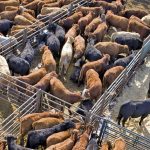Now that Monsanto has spurned the Canadian Wheat Board’s request that it stop its drive for preliminary approvals for its genetically modified wheat, the farmer-run agency is switching to Plan B.
And if the federal government refuses to act on Plan B, the board may move to Plan C, which would see the board ask for a court injunction to stop the unconfined release of Roundup Ready wheat.
Patty Rosher, the wheat board official managing the issue, said the board needs someone to take action before it is too late.
Read Also

VIDEO: Catch up with the Western Producer Markets Desk
The Western Producer Markets Desk provides daily updates on agricultural markets, with recent video commentary including looks into canola, wheat, cattle and feed grains.
“We really need this to be dealt with right away,” Rosher said.
“The timeline for Roundup Ready wheat is upon us. We are in the middle of it. We need something as soon as possible.”
The board asked Monsanto in May to voluntarily withdraw its genetically modified wheat from the Canadian Food Inspection Agency’s environmental approvals process.
The board is worried that if GM wheat is allowed to be grown without CFIA supervision, wheat pollen could spread to other wheat fields and pass GM characteristics to non-GM crops.
That would be a big problem if buyers of Canadian wheat refused to take GM wheat, and started testing Canadian wheat shipments for GM DNA. If those buyers had zero or low tolerance for GM DNA, Canadian farmers could lose markets.
Rosher said the board was saddened but not surprised by Monsanto’s June 25 refusal to pull out of the CFIA testing.
“Monsanto has essentially disregarded our concerns about unconfined release,” Rosher said.
“That could be trouble.”
The board is asking the federal government to modify existing regulations so that “market acceptance” can be considered within the regulatory system before a novel crop is allowed to be commercially released or grown without supervision.
Rosher said the government appears to understand the issue and the board’s concern, but has not revealed whether it will step in to delay the introduction of GM wheat until the board’s concerns are alleviated.
The board is willing to apply for a court injunction against Monsanto if that is its only way to block the introduction of GM wheat.
“We’re looking at all of our options and we’re going to do whatever we have in our means to prevent this from happening,” Rosher said.
The CFIA approvals process can take from less than a year to more than two years.
Monsanto spokesperson Trish Jordan said her company does not want to have a dispute with the wheat board, but it needs to complete the food, feed and environmental approvals process to prove that its GM wheat is safe and good.
“Until we get regulatory approval, you cannot promote the benefit of the technology with farmers or with customers,” Jordan said.
“Regulatory approvals we believe will help build consumer confidence in the safety of biotech wheat.”

















